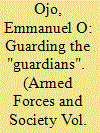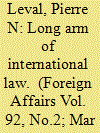| Srl | Item |
| 1 |
ID:
088938


|
|
|
|
|
| Publication |
2009.
|
| Summary/Abstract |
Of all new states in Asia, Latin America, and Africa, Nigeria qualifies as one that has suffered recurring praetorianism. Nigeria was under firm military autocracy and absolutism for a longer period than civil rule. It is against this background that transitions from the military to civil rule in 1999 made the polity heave a sigh of relieve. However, the performance of the civil government is now a serious concern because of the system's inability to nurture and sustain democracy. Thus, this article reviews all previous coups and attempts an in-depth analysis of salient factors that may be a harbinger of democratic reversal. This paper infers that the performance of the state makes the military an alternative that is only waiting for another auspicious period to terminate the fledging democracy. The article calls for an increase in social spending if the so-called dividend of democracy will make Nigerians a catalyst for democracy.
|
|
|
|
|
|
|
|
|
|
|
|
|
|
|
|
| 2 |
ID:
117968


|
|
|
|
|
| Publication |
2013.
|
| Summary/Abstract |
In late 1945, the Allied victors of World War II established a military tribunal in Nuremberg, Germany, which convicted Nazi leaders for their wartime atrocities. The animating principle of the trials was that conduct of extreme inhumanity violated the part of international law that protects fundamental human rights, which applies everywhere, even though the conduct was authorized by German law under the Third Reich. Since then, the world has accepted that the worst human rights abuses -- including genocide, slavery, torture, and war crimes -- are crimes prohibited by international law, even if they are expressly permitted by the laws of the state in which they occur.
|
|
|
|
|
|
|
|
|
|
|
|
|
|
|
|
| 3 |
ID:
092874


|
|
|
|
|
| Publication |
2009.
|
| Summary/Abstract |
This article explores the trial of Japanese war criminals by the People's Republic of China in the 1950s and explains why China decided to try these war criminals in a lenient and humanitarian way, why the trial was held only in 1956 and not earlier, and how these Japanese war criminals were persuaded to change their stance from stubborn denial to open confession of their guilt and regrets. Drawing on declassified documents concerning the trial released by the Chinese Ministry of Foreign Affairs in May 2006, this article finds that the timing and the conduct of the trial were intertwined with China's political strategy in relation to Japan at that period of time.
|
|
|
|
|
|
|
|
|
|
|
|
|
|
|
|